Body contouring after major weight loss improves the shape and tone of your underlying tissue that supports fat and skin and removes excess sagging fat and skin.
Enhancing your appearance with body contouring surgery
Following weight reduction surgery, or any substantial amount of weight loss, the skin and tissues often lack elasticity and cannot conform to the reduced body size. As a result, skin that has been severely stretched now is unsupported:
Surgical body contouring following major weight loss improves the shape and tone of your underlying tissue that supports fat and skin, and removes excess sagging fat and skin.
The result is a more normal appearance to the body, with smoother contours. This is, in essence, the final phase of your total weight loss experience.
Is it right for me?
Before you decide to undergo body contouring following major weight loss, your weight loss must be stabilized.
If you had weight reduction surgery, your plastic surgeon will work closely with your physician to determine when it is appropriate for you to begin body contouring.
Good candidates for body contouring are:
What happens during body contouring surgery?
The procedures necessary to achieve your goals will be defined along with a plan for the timing of these procedures. Plastic surgery procedures that may be recommended by your physician include:
Step 1 – Anesthesia
Medications are administered for your comfort during the surgical procedures. The choices include intravenous sedation and general anesthesia. Your doctor will recommend the best choice for you.
Step 2 – The incision
All body contouring procedures require incisions to remove excess skin. In many cases, these incisions may be extensive.
Incision length and pattern depend on the amount and location of excess skin to be removed, as well as personal preference and your doctor’s surgical judgment.
Advanced techniques usually allow incisions to be placed in strategic locations where they can be hidden by most types of clothing, but this is not always the case.
Body contouring is often performed in stages. Your particular condition and goals, as well as your plastic surgeon’s best judgment, will all influence how your doctor defines a surgical plan. While it may have taken you two years or more to lose all the excess weight, it may take equally as long for the results of your body contouring to be complete.
Body Lift
A complete lower body lift treats sagging buttocks, abdomen, waist, hips and outer thighs in one procedure or in staged procedures. Incision patterns vary, and may include a circumferential incision around the body to remove the “belt” of excess skin and fat.
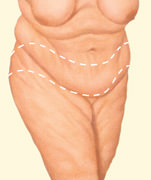
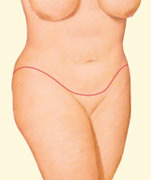
Breast Lift
The incision patterns for lifting a woman’s sagging breasts will be determined based on the amount of excess skin to be removed.
These may include one or a combination of incisions in a circular pattern around the areola, in a line extending from the areola to the breast crease, and horizontally along the breast crease.
A breast implant also may be recommended to enhance breast shape and size.
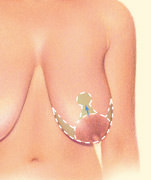
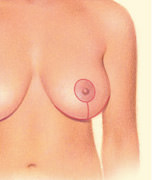
Arm Lift
Sagging skin in the upper arms is treated with an incision from the underarm area extending along the inside or back of the upper arm. Additional incisions on the arms may be necessary anywhere excess skin has formed sagging pockets.
The smoother, tighter contours that result from upper arm contouring are apparent almost immediately, although initially obscured by swelling and bruising. In addition, skin quality is dramatically improved in both appearance and texture.
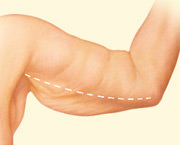
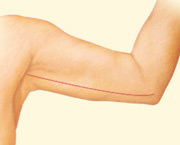
Thigh Lift
Reshaping of the thighs is achieved through incisions in the groin that can extend downward to the knee along the inner portion of the thigh.
Improving contours of the outer thigh may require an incision extending from the groin around the hip. Through these incisions your plastic surgeon will tighten tissues for a smoother, better toned thigh.
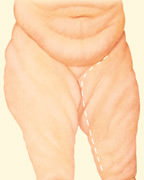
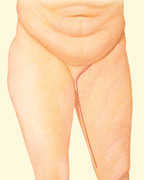
The decision to have body contouring surgery is extremely personal and you’ll have to decide if the benefits will achieve your goals and if the risks and potential complications are acceptable.
Your plastic surgeon and/or staff will explain in detail the risks associated with surgery. You will be asked to sign consent forms to ensure that you fully understand the procedure you will undergo and any risks and potential complications.
Possible risks of body contouring following major weight loss include:
After your body contouring procedure is completed, dressings or bandages will be applied to the incisions. A small, thin tube may be temporarily placed under the skin to drain any excess blood or fluid that may collect.
You will be given specific instructions that may include: How to care for your surgical site(s) following surgery, medications to apply or take orally to aid healing and reduce the risk of infection, specific concerns to look for at the surgical site or in your general health, and when to follow-up with your plastic surgeon.
When you go home
If you experience shortness of breath, chest pains, or unusual heart beats, seek medical attention immediately. Should any of these complications occur, you may require hospitalization and additional treatment.
The practice of medicine and surgery is not an exact science. Although good results are expected, there is no guarantee. In some situations, it may not be possible to achieve optimal results with a single surgical procedure and another surgery may be necessary.
Be careful
Following your physician’s instructions is key to the success of your surgery. It is important that the surgical incisions are not subjected to excessive force, abrasion, or motion during the time of healing. Your doctor will give you specific instructions on how to care for yourself.
The results of a body contouring following aggressive weight loss are visible almost immediately.
However, it may take as many as one to two years or more for the final results of all the recommended body contouring procedures to fully develop. Visible scars will remain, but the overall results are long lasting, provided that you maintain a stable weight and general fitness.
As your body ages, it is natural to lose some firmness. However, most of your initial improvement should be relatively permanent.
Cost is always a consideration in elective surgery. Prices for body contouring procedures can vary widely.
A surgeon’s cost for body contouring procedures may vary based on his or her experience, the type of procedure used, as well as geographic office location.
Many plastic surgeons offer patient financing plans, so be sure to ask.
Cost may include:

Our office remains committed to providing medically necessary care to our patients and are offering alternate ways for patients to consult with their physician during these difficult times. Please call our office at 757-466-1000 to discuss your appointment options.